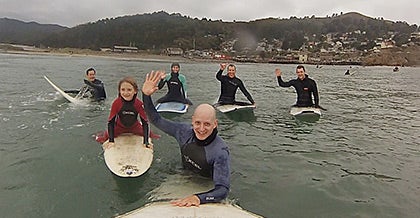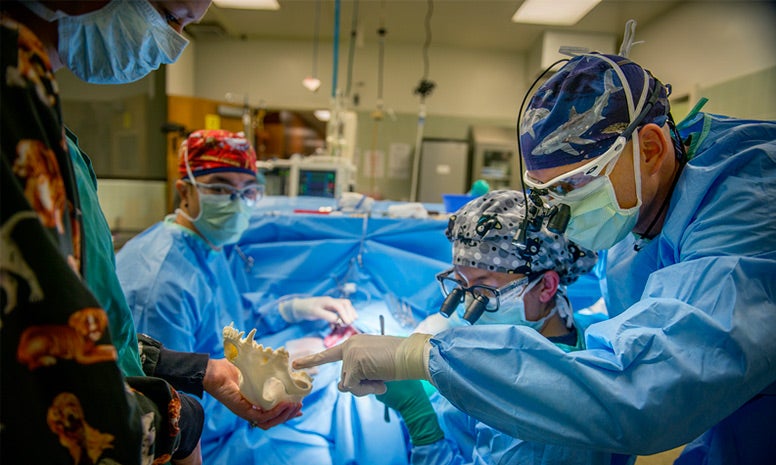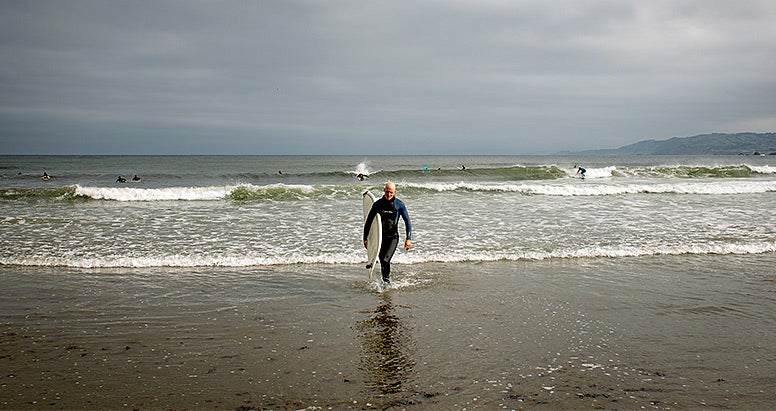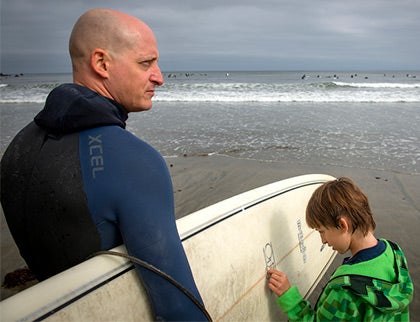Veterinary Surfing Club Created

Surfing is one of those contagious sports. At UC Davis, it has spread from veterinary professors and staff to students, who in late 2014 established the School of Veterinary Medicine Surfing Club.
Each Sunday a group heads for Pacifica's Linda Mar Beach south of San Francisco. A few of the 45 participants are longtime surfers but many are just learning.
Some students purchase wetsuits but rent their boards from a coastal surf shop. After three hours of Sunday surfing, they break for lunch or doughnuts.
“Surfing has taught me to relax,” says veterinary student and club member Taylor Calloway. “I’ve learned to go with the flow of the ocean, but always be ready to catch a good wave.”
The club also is committed to supporting preservation of the coastal environment and in March brought a Monterey Bay Aquarium veterinary researcher to UC Davis to discuss marine and coastal conservation.
Veterinary students interested in the club can request more information from co-president Andrea Aghaian or ask to be added to the club’s listserv by contacting Professors Sean Owens or Boaz Arzi.
Crisp and sunny, it is a drop-dead gorgeous January morning at Linda Mar Beach in Pacifica, south of San Francisco. Some 50 wetsuited surfers are stretched shoulder-to-shoulder across the cove, bobbing expectantly beyond the breakline of tightly curled waves.
Here, not far from the site of the annual Mavericks big-wave surf contest, midwinter breakers are often crashing wildly. Today, the water is flat and the waves tame. But for one surfer in the lineup, they do not disappoint.
Any day of surfing, says UC Davis veterinary surgeon Boaz Arzi, is “work-life balance at its best.” Passionate about his sport and his profession, the assistant professor finds the waves to be good medicine for the rigors of the operating room.
Arzi is reserved, focused and meticulous — just the person you want on the other end of a scalpel. But surprisingly, in both his professional and recreational worlds, he lives life a bit on the edge.
High-tech healing for dogs and cats
Working with veterinary and engineering researchers, he has helped adapt groundbreaking biomedical technology to regrow jawbones in dogs struck with cancer or horrific injuries. Animals that once would have been left with severe facial disfigurements and impaired function now go home whole and healthy.
Also, a new stem-cell therapy that Arzi and colleagues developed to treat cats with chronic inflammatory disease of the mouth is proving successful and may soon be used on a trial basis to treat humans with a similar disorder.
Weekdays find Arzi in the operating room, laboratory or classroom. But almost every weekend he swaps his scrubs for a wetsuit and heads to the coast, a world away from his campus duties.
“Going into the ocean changes the way you look at life,” he says. “When you feel the energy of the ocean, it’s mind-blowing.”
Growing up a surfer boy
‘I would be in school looking out the window, see the waves building, and at 3 o’clock I was out the door. I would come back home at night completely stoked.’
— Boaz Arzi
Arzi learned to surf on a shortboard at age 8, growing up in Israel, not far from Tel Aviv.
Surfing was in its infancy in Israel but it captivated him in a way that school never did. He struggled with academics, lacking interest although not aptitude.
Wisely, his parents saw in surfing the proverbial “carrot” — if he would keep up with school, he could surf. Later, they even saw to it that he had access to the Tel Aviv Marina, where he could conveniently store his board.
“This is where I literally grew up,” says Arzi, scanning an online picture of the Tel Aviv Marina and nearby Hilton Beach, now one of Israel’s top 10 surfing beaches.
“I would be in school looking out the window, see the waves building, and at 3 o’clock I was out the door,” he recalls. “I would come back home at night completely stoked."
And somehow, that all-consuming passion for surfing kept him moving in the right direction.
“I didn’t have to do drugs — surfing kept me out of trouble,” he says.

Veterinary career path emerges
His surfing opportunities dipped while serving in the military and then attending veterinary school at Szent István University in Budapest, Hungary. But upon graduation, he and his wife, Natasha, who is also a veterinarian, relocated to his childhood home in Haifa, bringing him back to familiar waters.
He and partners purchased Moriah Veterinary Center in Haifa. Soon he was doing most of the surgeries in the busy referral practice.
By then possessing the focus he so desperately lacked as a schoolboy, Arzi decided his veterinary future lay in dentistry and oral maxillofacial surgery — an emerging specialty field involving injuries and ailments of an animal’s head, neck, face, jaws and mouth.
Lands a residency at UC Davis
Arzi and his young family arrived on New Year’s Day 2008 in Davis, where he had landed a dental and surgical residency at UC Davis’ School of Veterinary Medicine — considered then, and now, to be the leader in that specialty. As they settled into their Central Valley home, surfing was not even on their radar.
"Then one morning, I walked down the sidewalk and saw that the newspaper in my neighbor’s driveway had a picture of a person surfing a really big wave,” Arzi recalls. “I asked, ‘Where is this beach?’ And the next day I was there.”
He has returned to the surf near Pacifica at least weekly ever since, often with his family or colleagues from the veterinary school.
It is as much a necessity as a hobby, he says.

Surgeon finds work-life balance
Arzi’s work world can blur into a scramble for research funds; long hours in the laboratory, operating room or classroom; and the often heart-wrenching responsibility of caring for dogs, cats — and their owners.
Not every animal can be saved. Not every owner will choose to do so. For compassionate high-achievers, as veterinarians tend to be, the burden can take its toll.
“In our profession, one of the biggest dangers is fatigue — compassion fatigue,” Arzi says. “It’s easy to get into the stream of things and forget to prioritize and balance your life; that’s when people start to pay a high price.”
And so he has learned to leave work behind — at least for a while.
A day at the surf
‘When you get to the ocean and see the waves … it totally puts you in a different mode of thinking — there is a connection with the ocean, a connection with Earth.’
— Boaz Arzi
It is still dark when Arzi and his 9-year-old son Jonathan leave Davis, wetsuits and gear stashed neatly in plastic tubs and boards strapped firmly to the car. One last online check reveals the surf conditions for the day.
Even after 30 years riding the waves, Arzi finds each surfing day begins with a few jitters.
“You start having ‘butterflies’ — like a teenager before a date,” he says.
Arriving at the beach, they pull out Arzi’s off-white longboard and Jonathan’s shorter, faded red board. After exchanging a double high-five, father and son tug on their wetsuits, slather on thick coats of sunscreen, and trudge toward the water, their boards in tow.
“When you get to the ocean and see the waves, nothing else matters,” Arzi says. “It totally puts you in a different mode of thinking — there is a connection with the ocean, a connection with Earth.”
“And when we paddle in and surf, again, you feel that you are in one place in one time. You feel alive; you feel very much alive,” he says.
Father and son in the surfing lineup
Pacifica’s Linda Mar Beach offers waves to suit a broad range of abilities. It is relatively safe and an ideal place for Jonathan to train. Together the two paddle out across the breakline and point their boards back toward the beach. Already, the younger Arzi has learned patience and the rewards of waiting for a wave worth riding.
“You wait until you can feel that you’re connected to the wave, then you stand up,” Jonathan says. With sun-bronzed hair and small gold hoops piercing his ear lobes, he is every inch a surfer.
Surfing has forged “a bond that is unparalleled” between father and son, Arzi says. “I feel so fortunate to share this with him. When I see him catch a wave, I get stoked.”
Lessons in the surf

Arzi’s own school-age struggles have shaped how he raises Jonathan and 6-year-old daughter Eden.
“I try to teach them to be a good person, let them explore and not be obsessed about grades," he said.
When a sea lion pops up alongside Jonathan’s surfboard or crabs scurry away from the breaking surf, nature becomes both the classroom and the teacher.
And so, for father and son, the ocean and surfing are instructive, freeing and rejuvenating. Ironically, they very much mirror Arzi’s life as a surgeon.
Back in the operating room
The morning of a surgery dawns with its own case of nerves that prime Arzi to deliver his best. Hours of in-depth study and practice have been logged long before Arzi steps into the operating room. Often, he prepares using plastic models of the patient’s skull made with a 3-D printer.
About 20 minutes before each surgery, he finds himself slipping into a zone of intense concentration.
“It's complete focus. Nothing else matters,” he says. “You leave civilization behind, and you go to the OR, and you're completely there — 120 percent invested in your case.”
Classical music wafts over the blue-gowned surgeons and veterinary students, clustered around the operating table and canine patient. The soothing music is something Arzi learned to appreciate through his mentor and veterinary surgical chief, Frank Verstraete.
How UC Davis Helps Dogs
“It calms me down and focuses me,” Arzi says. “It narrows your senses into something very narrow.
“This focus — you're in one place at one time, doing this thing, and you are completely invested in it and dedicated to it — this is addicting."
Changing another’s misfortune
Beyond providing his students with basic skills and advanced surgical techniques, Arzi encourages them to think deeply about what they are doing and why they find it rewarding.
“I ask the students all the time when we go to the OR, ‘Why are you happy to fix a dog or a cat?’” he says. “From what I gather, I think it’s that sense of being needed, the sense of making a difference and being able to change somebody’s misfortune, that drives people.”
In his two parallel universes — surfing and surgery — Arzi finds both challenge and fulfillment.
“For me it’s a way of life,” he says. “I’m a surfer and I am a doctor: It’s everything.
“They both require creativity and thinking outside the box to do something different. You have to have the urge to just do it.”
Parallel universes both require passion
While surfing may not call for the same level of finesse required of a surgeon, it does demand the same internal calm, focus — and passion.
“You have to be passionate,” Arzi says. “A person has to be passionate to be successful.”
Pausing to contemplate where life has taken him, he admits that his grade-school teachers would never have foreseen his life’s path.
“If you had told anyone that the surfer boy would be a professor, no one would have believed you,” he says, smiling broadly.
Media Resources
Joe Proudman, Strategic Communications, UC Davis